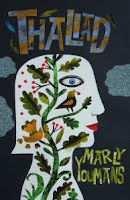 I notice that you have decided that I am a New Formalist. You may like to know that, in fact, I did not know the term until a few years ago, about the time Kim Bridgford invited me to be on a panel and later to run a panel at the West Chester Poetry Conference. Even now, I am not entirely sure what New Formalism is, other that a list of those poets who are willing to write in meter and sometimes rhyme. I occasionally go by Eratosphere to see what some of those people are doing and who has a new book. Somehow I don't think that's enough to make me a member of a literary movement.
I notice that you have decided that I am a New Formalist. You may like to know that, in fact, I did not know the term until a few years ago, about the time Kim Bridgford invited me to be on a panel and later to run a panel at the West Chester Poetry Conference. Even now, I am not entirely sure what New Formalism is, other that a list of those poets who are willing to write in meter and sometimes rhyme. I occasionally go by Eratosphere to see what some of those people are doing and who has a new book. Somehow I don't think that's enough to make me a member of a literary movement.  And I would not dare to claim a part in any movement, as I completely failed in my duty to live in large cities and know poets. In fact, I lived for a very long time without knowing many poets--I seemed to know mostly fiction writers and painters. Now I know more, thanks to twitter and Facebook and such places, but I can't say that I have restricted my knowledge to writers who like meter and rhyme.
And I would not dare to claim a part in any movement, as I completely failed in my duty to live in large cities and know poets. In fact, I lived for a very long time without knowing many poets--I seemed to know mostly fiction writers and painters. Now I know more, thanks to twitter and Facebook and such places, but I can't say that I have restricted my knowledge to writers who like meter and rhyme.* * *
My favorite-via-email response from a poet and writer: "My sense is that Dana Gioia and the others in the late ‘80s and early ‘90s who deliberately pushed to repopularize form are the real “New Formalists.” (Wasn’t there a journal by that name? They even had a nice anthology called, I believe, Rebel Angels.) Now that they’ve all done their thing and taken the heat for it, for which I am very grateful, we should all just be “poets” and leave it at that, methinks. Besides, I reserve the right to go bonkers in free verse whenever I please." -J.

Hah! True enough, Tim...
ReplyDeletemaybe it's a kind of reconstructionism? you know, the way history repeats itself except when it does the opposite? quien sabe...
ReplyDeletePerhaps! The ways of the Wiki-world are mysterious, but they certainly have some relation to our own!
DeleteHow about Transcendental Formalist, implying you've done the drudgery, digested the gobbets, risen on wings and gone on to a shinier, superior version of the old received wisdom.
ReplyDeleteI mean even I myself might have "analyze(d), interpret(ed), or evaluate(d) the inherent features of a text. (Have tackled) not only grammar and syntax but also literary devices such as meter and tropes."
And sure as eggs are eggs I've reduced "the importance of a text’s historical, biographical, and cultural context."
Done all this while subbing a press release about forklift trucks back in the days of gainful employment. Mind you this is all good old-fashioned Formalism. I haven't checked the significance of "New".
I've always aspired to being an Old Pragmatist and accept the concomitant implications of compromise. As in politics it's what makes the wheels go round.
Yes, if there are to be labels, I want to make them up myself! And the absurder the better, since I have never had the luck of being part of a lively bunch of writers.
DeleteIt seems odd to have the label when there are people like Richard Wilbur or the late Anthony Hecht who never quit writing formal verse. And in the UK, it appears that y'all are much more relaxed about the issue. Or am I reading the situation incorrectly?
The various situations of us vs. them, Democrats vs. Republicans, white collar vs. blue collar, etc. has become so polarized in the states that I suppose it's no wonder that American poets had to jump in and be formalists vs. free versers. But it's sad. We're offering such a diminished tradition to young writers, especially now that English literary studies doesn't always include the giants of the past.